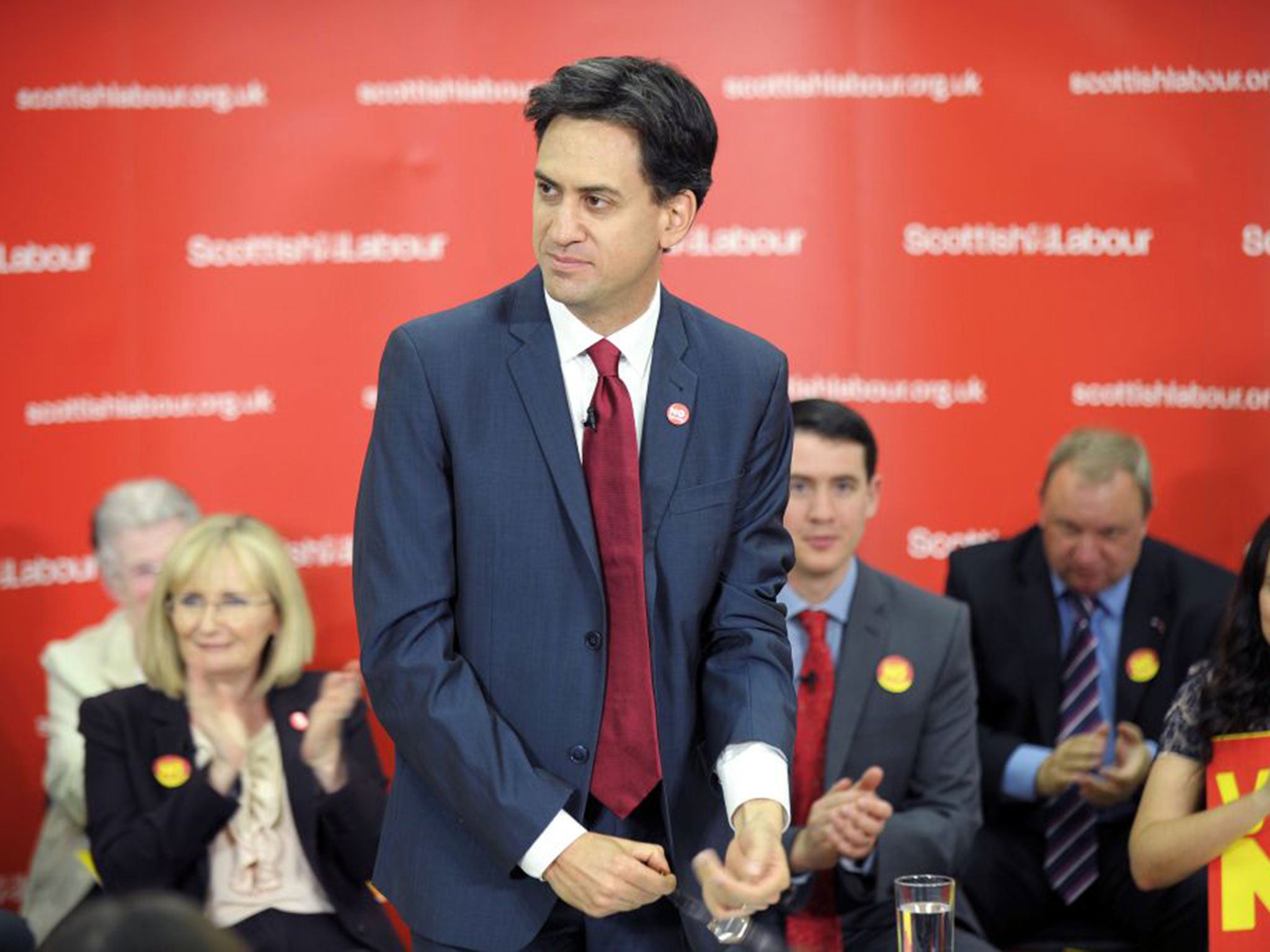Scottish independence: After the revolution the rest of the UK will be seeking a rebalancing act
Ed Miliband has to play down some of the ideological differences to keep his party united


We are living through an eccentric revolution. Normally constitutional change in the UK moves at a snail’s pace. Think of the many arduous attempts to reform the House of Lords – the commissions, the reviews of the commissions and then the reviews of the reviews. Nothing happens. In contrast, Scotland has been offered new powers after just a few hours of frenzied negotiations. The rest of the UK will seek a rebalancing. It might not be content with the snail’s pace.
Yet if the cause of the swing towards Yes in Scotland was a hunger for more power, the contest would be over. After last week it has secured new powers. The No campaign would be surging ahead if that was key. Since Gordon Brown announced the powers and the timetable for implementation last Monday the leaders of the No campaign have been a little calmer, but they are hardly striding confidently towards an easy win.
That is because something else fuels the Yes vote – the decline of the two parties that have dominated UK politics and once battled it out in Scotland. A leading Labour figure from the No campaign tells me that one of the complaints that recurs repeatedly is that “they are all the same,” the Labour government being perceived as little different from the Conservative administrations before 1997 and since 2010. The Labour party in Scotland, once a mighty force, struggles to enthuse its natural supporters. Meanwhile, the Conservative party is as toxic as it was in the Thatcher era, for the good reason that it is still a Thatcherite party. In the vacuum erupts a great big dissenting force that goes well beyond the SNP.
The Yes insurrectionaries should not be over-romanticised. It is easier and on the whole more fun to be disillusioned than to examine the details too closely. There were very big differences after 1997, not least in spending on the NHS. But it is easy to understand why, in the minds of some voters, the New Labour era appears to have been part of the same story as what went before.
There was Tony Blair, the most silver-tongued leader since 1945, exhausting his mesmerising powers of advocacy to put the case for an alliance with a Republican president, and on the domestic front for “reform” of public services – changes that David Cameron fully supported. As a Chancellor and Prime Minister Gordon Brown acquired a muffled public voice as he sought to appear as the apolitical father of the nation. His authentic voice – that powerful, restless advocate of social democracy – is a pivotal feature of the referendum campaign, but was rarely heard before. In the referendum campaign Blair is all but silent while Brown speaks with a passion. He is no longer troubled by fears that middle England might disapprove.
A senior Labour figure from England tells me that the decline of the Scottish Labour party was a two-way process. Some voters in Scotland might have disapproved of what was happening at Westminster, but senior party leaders from Westminster were told by their Scottish counterparts to keep away from the Scottish Labour party. Senior figures in England lost interest because they were discouraged to show concern. The decline intensified. So when Labour in Scotland tries to pull levers, it’s not surprising that the voters at the other end are not as responsive as they used to be. The Conservatives, meanwhile, have no levers to pull.

I have a lot of sympathy for those Conservative MPs protesting that a constitutional revolution has been unleashed without a single debate in what is still the UK’s elected chamber. In an article on Sunday, Ed Miliband argued that part of the rebalancing must be more power for local government in England. But if the powers for Scotland are as sweeping as the Westminster party leaders suggest that will be nowhere near enough as an act of rebalancing. The old unanswerable West Lothian question might be close to being answered. In essence the question related to why Scottish MPs voted on legislation that impacted only on England while English MPs had no such powers over Scottish matters. The answer could well be that Scottish MPs will be deprived of legislative powers over England.
Rather like offering referendums, proposing to give power away is relatively easy and popular. Holding the referendums can be a nightmare and so can working through the consequences of devolving powers once the easy offer has been made.
The irony is that ideologically Miliband is not remotely close to Cameron. There is no way that voters can conclude that they are “ all the bloody same”. Miliband has to play down some of the ideological differences to keep his uneasy party united and to get the tiniest hearing in sections of the media. But even so no one, even in disillusioned Scotland, will be able to conclude that there is no choice at next year’s election.
But there is another irony. If Miliband were to win, he risks being in a position where he seeks to make radical change and finds he has given away the powers to do so. In which case voters will conclude again that they are “all the bloody same”.
If there is a Yes vote on Thursday we are in those much-referenced uncharted waters. If No wins, stormy waters will need to be navigated with considerable care if any national UK leader wants to be in a position to wield significant power again.



